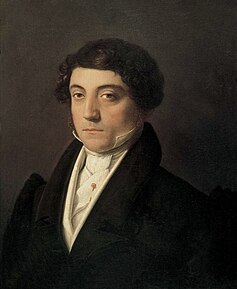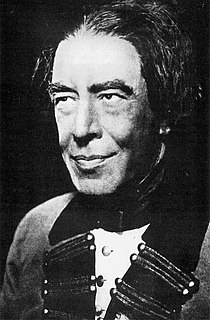
Antonio Salieri was an Italian classical composer, conductor, and teacher. He was born in Legnago, south of Verona, in the Republic of Venice, and spent his adult life and career as a subject of the Habsburg Monarchy.

La Betulia liberata is the title of a libretto by Pietro Metastasio which was originally commissioned by Emperor Charles VI and set by Georg Reutter the younger in 1734. It was subsequently set by as many as 30 composers, including Niccolò Jommelli (1743), Ignaz Holzbauer (1752), Florian Leopold Gassmann (1772), Leopold Kozeluch (1780), Joseph Schuster (1787), and most famously Mozart (1771).

Elisabetta, regina d'Inghilterra is a dramma per musica or opera in two acts by Gioachino Rossini to a libretto by Giovanni Schmidt, from the play Il paggio di Leicester by Carlo Federici, which itself "was derived from a novel The Recess (1785) by Sophia Lee."

Giulio Sabino is a dramma per musica in three acts by Giuseppe Sarti. The libretto was by Pietro Giovannini.

Armida is an operatic dramma per musica by Antonio Salieri in three acts, set to a libretto by Marco Coltellini. The plot is based on the epic poem Gerusalemme liberata by Torquato Tasso. Lully, Handel and Traetta, to name but a few, had already composed operas based on the situations that Tasso originally developed. The plot of all of these, and Salieri's work, is based on the relationship between Armida and the Crusader Rinaldo.

Fra i due litiganti il terzo gode is a dramma giocoso in two acts by Giuseppe Sarti. The libretto was after Carlo Goldoni's Le nozze.

Prima la musica e poi le parole is an opera in one act by Antonio Salieri to a libretto by Giovanni Battista Casti. The work was first performed on 7 February 1786 in Vienna, following a commission by the Emperor Joseph II. The opera was first performed at one end of the orangery of the Schönbrunn Palace in Vienna by an Italian troupe; simultaneously, Mozart's Der Schauspieldirektor was staged at the other end.

Les Danaïdes is an opera by Antonio Salieri, in five acts: more specifically, it is a tragédie lyrique. The opera was set to a libretto by François-Louis Gand Le Bland Du Roullet and Louis-Théodore de Tschudi, who in turn adapted the work of Ranieri de' Calzabigi. Calzabigi originally wrote the libretto of Les Danaïdes for Christoph Willibald Gluck, but the aged composer, who had just experienced a stroke, was unable to meet the Opéra's schedule and so asked Salieri to take it over. The plot of the opera is based on Greek tragedy and revolves around the deeds of the mythological characters Danaus and Hypermnestra.

Der Rauchfangkehrer, oder Die Unentbehrlichen Verräther ihrer Herrschaften aus Eigennutz is an opera in three acts by Antonio Salieri to a German libretto by Leopold Auenbrugger. Originally designated as a Musikalisches Lustspiel, the work has the characteristics of both a German Singspiel and an Italian opera buffa.

La scuola de' gelosi is a dramma giocoso in two acts by Antonio Salieri, set to a libretto by Caterino Mazzolà.

Falstaff, ossia Le tre burle is a dramma giocoso in two acts by Antonio Salieri, set to a libretto by Carlo Prospero Defranceschi after William Shakespeare's The Merry Wives of Windsor.

La grotta di Trofonio is an opera, described as an opera comica, in two acts composed by Antonio Salieri to an Italian libretto by Giovanni Battista Casti.

Les Horaces is an operatic tragédie lyrique by Antonio Salieri. The text was by Nicolas-François Guillard after Pierre Corneille's Horace.

Theater am Kärntnertor or Kärntnertortheater was a prestigious theatre in Vienna during the eighteenth and nineteenth centuries. Its official title was Kaiserliches und Königliches Hoftheater zu Wien.

Aureliano in Palmira is an operatic dramma serio in two acts written by Gioachino Rossini to an Italian libretto in which the librettist was credited only by the initials "G. F. R." The libretto has generally been attributed to Giuseppe Felice Romani, but sometimes to the otherwise unknown Gian Francesco Romanelli. It has been suggested that the latter name may have resulted from a confusion of Romani with Luigi Romanelli, La Scala's house poet prior to Romani's appointment to the post.

The Mistress of the Inn, also translated as The Innkeeper Woman or Mirandolina, is a 1753 three-act comedy by the Italian playwright Carlo Goldoni about a coquette. The play has been regarded as his masterpiece. Frederick Davies describes it as Goldoni's Much Ado About Nothing.

L'amore innocente composed by Antonio Salieri (1750–1825), is an Italian-language opera in two acts. Stylistically, it is a pastoral opera and is very similar to the mid-18th-century Roman Intermezzo. The libretto was written by Giovanni Gastone Boccherini, dancer, poet and stage manager, brother of the composer Luigi Boccherini.

Siroe, or Siroe re di Persia, is an opera seria in three acts by Johann Adolph Hasse. The libretto was by Metastasio. As with many of the latter's libretti, Siroe was also set by Hasse's contemporaries, for example Vinci, Vivaldi and Handel.












